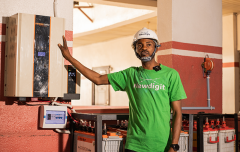Renewable Energy and Electric Vehicle Manufacturing in Kenya: Policy and Investment Pathways to Maximize Benefits
Developing local value chains for renewable energy and electric vehicle technologies is becoming a key policy priority across the Global South. Alongside energy transition and green growth strategies, this shift represents an opportunity to reduce import dependency, build local industries by leveraging existing capacities and resources, and create jobs across the entire value chain. Achieving these goals requires a comprehensive industrial policy framework, incorporating long-term strategic planning, supply- and demand-side incentives, and interventions focused on education, training, trade, technology transfer, logistics, and complementary infrastructure development.
Kenya is taking measures to accelerate the energy transition, leveraging its vast renewable energy resources and strong policy frameworks to drive sustainable economic growth. In 2023, the country adopted its Energy Transition and Investment Plan (ETIP), developed in partnership with Sustainable Energy for All (SEforALL), outlining the investments needed to achieve net-zero emissions by 2050. The ETIP projects a 20-fold increase in power demand by 2050, which highlights a critical importance of local value addition to ensure the country’s population is well-positioned to harness additional economic benefits brought by the net zero transition.
The Draft National Energy Policy 2025-2034 lays a strong emphasis on establishing an enabling environment to spur local manufacturing hubs for renewable energy technologies and ancillary components with backward linkages to critical minerals to reduce import reliance. The Draft National E-mobility Policy also recognizes the need for achieving higher shares of local content in the e-mobility value chain leveraging on a vibrant domestic e-mobility sector that is aiming to drive local value chain development for various applications, including two-/three-wheelers and buses. Kenya’s participation in regional trade agreements and global supply chains further enhances its opportunities for value addition and export-led industrialization.
Against this backdrop, SEforALL has developed the Kenya Green Manufacturing Policy and Investment Guide, a comprehensive resource consolidating information on existing policies and incentives for green manufacturers in solar PV manufacturing, EV assembly, and lithium-ion battery production. The guide also highlights emerging areas where targeted interventions are needed to further localize value chains, drive industrial growth, and maximize economic spillover effects.
This fifth webinar in the Africa Renewable Energy Manufacturing Initiative South-South Virtual Policy Dialogue Series will explore Kenya’s opportunity in building local value chains for solar PV, batteries and electric vehicles. Convening representatives from government, industry, financing institutions, and development partners, the discussion will focus on showcasing key investment priorities in the sector, identifying policy actions needed to support the local value chains, as well as addressing measures to bridge the financing and skills gap.
Guiding questions
- What are the key opportunities in Kenya’s renewable energy and electric vehicle manufacturing sector?
- How competitive is Kenya’s green manufacturing sector in comparison to other regional and global players, and what industrial policy measures are needed to strengthen local and regional supply chains?
- What are the main asks from the international and local private sector in terms of policy support, incentives, and infrastructure to accelerate green manufacturing in Kenya?
- What specific financial mechanisms or incentives could be introduced or expanded to advance Kenya’s green manufacturing sector?
- What role do regional cooperation and trade agreements play in supporting Kenya’s ambition to become a premier destination for green manufacturing?
Agenda
12.30 – 12.45 High-level opening remarks
- Ali Mohamed, Special Envoy for Climate Change, Kenya
- George Ouma Nyongayo, Assistant Director Renewable Energy, State Department for Energy, Kenya
12.45 – 12.50 Scene-Setting presentation and soft launch of the Kenya Green Manufacturing Policy and Investment Guide
12.50 – 14.00 Interventions and discussion
Facilitator: Victor Gathogo, East Africa Lead, Global Energy Transition Initiative, ClimateWorks Foundation
Electric Mobility:
- Hans van Toor, Chair – Electric Mobility Subsector, Kenya Association of Manufacturers / Strategy and Innovation Manager, Roam
- Marian Muthui, Head of Manufacturing, BasiGo
- Michael Muchiri, Senior Principal Superintending Engineer, Ministry of Roads and Transport, Kenya
Solar PV and battery value chains:
- Diana Masika, Senior Renewable Energy Officer, Ministry of Energy, Kenya
- Ngotho Gathu, Director, Canto Systems Limited
- Paul Wambugu, Investment Manager, KenGen
Ecosystem Development:
- Robert Njoroge, Technical Advisor, GIZ Kenya
- Shuvai Madanhire, Chief Human Resources Officer, Spiro
Audience Q&A



